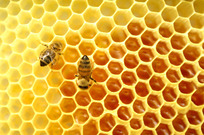A story in National Review, Bee-pocalypse Now? Nope. describes the situation:
You’ve probably heard by now that bees are mysteriously dying. In 2006, commercial beekeepers began to witness unusually high rates of honeybee die-offs over the winter — increasing from an average of 15 percent to more than 30 percent. Everything from genetically modified crops to pesticides (even cell phones) has been blamed. The phenomenon was soon given a name: colony collapse disorder.
Ever since, the media has warned us of a “beemaggedon” or “beepocalypse” posing a “threat to our food supply.” By 2013, NPR declared that bee declines may cause “a crisis point for crops,” and the cover of Time magazine foretold of a “world without bees.” This spring, there was more bad news. Beekeepers reported losing 42.1 percent of their colonies over the last year, prompting more worrisome headlines.
Based on such reports, you might believe that honeybees are nearly gone by now. And because honeybees are such an important pollinator — they reportedly add $15 billion in value to crops and are responsible for pollinating a third of what we eat — the economic consequences must be significant.
And, right on cue, facts not in hand, government comes galloping in to the rescue.
Last year, riding the buzz over dying bees, the Obama administration announced the creation of a pollinator-health task force to develop a “federal strategy” to promote honeybees and other pollinators. Last month the task force unveiled its long-awaited plan, the National Strategy to Promote the Health of Honey Bees and Other Pollinators. The plan aims to reduce honeybee-colony losses to “sustainable” levels and create 7 million acres of pollinator-friendly habitat. It also calls for more than $82 million in federal funding to address pollinator health.
There are more honeybee colonies in the United States today than there were when colony collapse disorder began in 2006. In fact, according to data released in March by the Department of Agriculture, U.S. honeybee-colony numbers are now at a 20-year high. And those colonies are producing plenty of honey. U.S. honey production is also at a 10-year high.
This is not to deny that beekeeping faces challenges. Today, most experts believe there is no one single culprit for honeybee losses, but rather a multitude of factors. Modern agricultural practices can create stress for honeybees. Commercial beekeepers transport their colonies across the country each year to pollinate a variety of fruits, vegetables, and nuts. This can weaken honeybees and increase their susceptibility to diseases and parasites.
But this is not the first time beekeepers have dealt with bee disease, and they do not stand idly by in the face of such challenges. The Varroa mite, a blood-sucking bee parasite introduced in 1987, has been especially troublesome. Yet beekeepers have proven resilient. Somehow, without a national strategy to help them, beekeepers have maintained their colonies and continued to provide the pollination services our modern agricultural system demands.


 RSS Feed
RSS Feed
